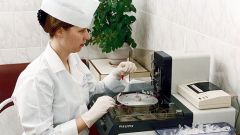As soon as the first symptoms appear in the form of pains and disorders, you should consult with a specialist who can prescribe a wide range of tests to check the bowel.
General analysis of blood and urine. It is important to check the level of hemoglobin and erythrocytes, leukocytes and ESR determines the existence of the inflammatory process.
Abdominal ultrasound allows you to see the size of the bodies, the indirect signs of gastritis and gastroduodenitis. You can also examine the contractile function of the gallbladder.
Coprology. Analysis of the feces, which "tells" about how to digest proteins, fats and fiber. The analysis on a dysbacteriosis will help to determine the existence of chronic infection. Cal carbohydrates - will allow to study the assimilation of glucose, lactose, starch and to identify functional disorders. Scraping will reveal intestinal parasites.
Endoscopy – gastroscopy allows us to consider the lining of the esophagus, stomach and duodenum for early diagnosis of ulcers and possible cancer.
Colonoscopy – a type of gastroscopy, but in this case, the endoscope is introduced behind and examine the rectum and colon.
Laparoscopy – endoscopic method, in which the apparatus is introduced into the hole, especially done by the doctor in the front of the abdomen. Applies when considering the threat of appendicitis, peritonitis, liver disease and gall bladder.
Biopsy. In the course of such examination is taken a small part of the gastrointestinal mucosa or tumor and studied under a microscope. This procedure is painless and fairly accurate and gives a great amount of information.
Sounding of the stomach contributes to gastric juice and a small amount of what is contained in the duodenum. Usually required for gastritis.
X – ray irrigoradiography lets you find out about the cluster gas, the presence of tumors and stones, and foreign objects (possibly accidentally swallowed). In addition, this part of the survey shows the different permeability of the gastrointestinal tract.
Biochemistry. Such measures as Alt, AST, bilirubin, alkaline phosphatase, and cholesterol will directly explain the current quality of the liver.
Research on the infection. In addition to infectious agents that can cause acute illness, there are microorganisms living in the intestines and causing chronic gastrointestinal diseases. For this reason this study is necessary.
In identifying various diseases of the intestine is required course treatment. Often the treatment can be carried out at home, but some forms of the disease require a more serious approach when the patient is placed on the hospital or the infectious Department.
Treatment of intestinal diseases, mostly carried out with the use of antibiotics. In this case, upon completion of the course the treatment will need to recovery rate - the use of preparations containing lactic acid bacteria and bifidobacteria. In rare cases, the treatment of the intestine is allowed simultaneous reception of these drugs and antibiotics.
The tests needed for the diagnosis of intestinal diseases
General analysis of blood and urine. It is important to check the level of hemoglobin and erythrocytes, leukocytes and ESR determines the existence of the inflammatory process.
Abdominal ultrasound allows you to see the size of the bodies, the indirect signs of gastritis and gastroduodenitis. You can also examine the contractile function of the gallbladder.
Coprology. Analysis of the feces, which "tells" about how to digest proteins, fats and fiber. The analysis on a dysbacteriosis will help to determine the existence of chronic infection. Cal carbohydrates - will allow to study the assimilation of glucose, lactose, starch and to identify functional disorders. Scraping will reveal intestinal parasites.
Endoscopy – gastroscopy allows us to consider the lining of the esophagus, stomach and duodenum for early diagnosis of ulcers and possible cancer.
Colonoscopy – a type of gastroscopy, but in this case, the endoscope is introduced behind and examine the rectum and colon.
Laparoscopy – endoscopic method, in which the apparatus is introduced into the hole, especially done by the doctor in the front of the abdomen. Applies when considering the threat of appendicitis, peritonitis, liver disease and gall bladder.
Biopsy. In the course of such examination is taken a small part of the gastrointestinal mucosa or tumor and studied under a microscope. This procedure is painless and fairly accurate and gives a great amount of information.
Sounding of the stomach contributes to gastric juice and a small amount of what is contained in the duodenum. Usually required for gastritis.
X – ray irrigoradiography lets you find out about the cluster gas, the presence of tumors and stones, and foreign objects (possibly accidentally swallowed). In addition, this part of the survey shows the different permeability of the gastrointestinal tract.
Biochemistry. Such measures as Alt, AST, bilirubin, alkaline phosphatase, and cholesterol will directly explain the current quality of the liver.
Research on the infection. In addition to infectious agents that can cause acute illness, there are microorganisms living in the intestines and causing chronic gastrointestinal diseases. For this reason this study is necessary.
Treatment
In identifying various diseases of the intestine is required course treatment. Often the treatment can be carried out at home, but some forms of the disease require a more serious approach when the patient is placed on the hospital or the infectious Department.
Treatment of intestinal diseases, mostly carried out with the use of antibiotics. In this case, upon completion of the course the treatment will need to recovery rate - the use of preparations containing lactic acid bacteria and bifidobacteria. In rare cases, the treatment of the intestine is allowed simultaneous reception of these drugs and antibiotics.

